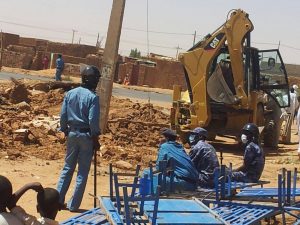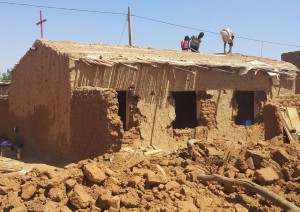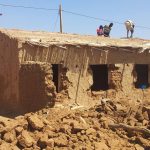JUBA, South Sudan (Morning Star News) – Sudanese authorities on Monday (Feb. 17) demolished a church building in Omdurman without prior notice, area sources said.
In what Sudanese Christians believe is part of a campaign by Islamist President Omar al-Bashir to rid the country of Christianity, bulldozers accompanied by local police and personnel from the National Intelligence and Security Services destroyed the Sudanese Church of Christ building in the Ombada area of Omdurman, across the River Nile from Khartoum, they said.
“The government has confiscated the land where the church was built – please pray for the church to get a place for worship,” a Christian who requested anonymity for security reasons said. “We had not any prior indication from the officials that the church would be destroyed; they have not even warned us.”
Officials gave no reason for the demolition except that, as it was located in a “Muslim area,” the 300-member church was not wanted there, the church member said. Another source, a church leader, confirmed to Morning Star News that authorities destroyed the building and confiscated the land without warning.
“We have orders from above to demolish this church building,” the police officer in charge of the demolition told the church member, sources said. “We do not want any church in this area.”
The orders came from the Ombada locality, or city council, the sources said.
Following the secession of South Sudan in July 2011, Sudan since 2012 has expelled foreign Christians and bulldozed church buildings on the pretext that they belonged to South Sudanese, but officials did not offer that basis in this case.
“Generally, the church is not wanted in the area,” the church member said.
Leaders of the church have yet to determine a site for worship this Sunday.
“Possibly the church will meet in a house of one of their members next week,” the source said.
Harassment, arrests and persecution of Christians have intensified since the secession of South Sudan, when Bashir vowed to adopt a stricter version of sharia (Islamic law) and recognize only Islamic culture and the Arabic language.
Besides raiding Christian bookstores and arresting Christians, authorities threatened to kill South Sudanese Christians who do not leave or cooperate with them in their effort to find other Christians (see Morning Star News, July 12, 2013).
South Sudan’s secession has also served as a pretext for Bashir’s regime to deport Christians based on their ethnicity, sources said. In a report issued in April 2013, Christian Solidarity Worldwide noted an increase in arrests, detentions and deportations of Christians since December 2012. The organization also reported that systematic targeting of Nuba and other ethnic groups suggests the resurgence of an official policy of “Islamization and Arabization.”
Due to its treatment of Christians and other human rights violations, Sudan has been designated a Country of Particular Concern by the U.S. State Department since 1999, and in April 2013, the U.S. Commission on International Religious Freedom (USCIRF) recommended the country remain on the list.
USCIRF noted the crackdown in a statement last year.
“With the independence of South Sudan, senior Sudanese government officials have called for a more comprehensive and rigid application of Sharia law in Sudan, where southerners who are Christian have been subject to a range of religious freedom violations,” USCIRF stated. “In particular, there have been credible reports of the destruction of churches, refusal to permit construction of new churches and other forms of intimidation and harassment.”
South Sudanese lost citizenship in Sudan and were ordered to leave by March 1, 2012, but thousands have been stranded in the north due to job loss, poverty, transportation limitations and ethnic and tribal conflict in South Sudan. South Sudanese Christians in Sudan have faced increased hostilities due to their ethnic origins – though thousands have little or no ties to South Sudan – as well as their faith.
Many foreign Christians have been expelled from the country, and others have fled.
###
© 2014 Morning Star News. Articles/photos may be reprinted with credit to Morning Star News.
Morning Star News is a 501(c)(3) non-profit corporation that relies solely on contributions to offer original news reports of persecuted Christians. Our mission is to inform those in the free world and in countries violating religious freedom about Christians worldwide who are persecuted for their faith. For free subscription or to make tax-deductible donations, contact [email protected], or send check to Morning Star News, 24310 Moulton Parkway, Suite O # 157, Laguna Hills, CA 92637, USA.
- Police watch as Sudanese Church of Christ building in Omdurman is demolished. (Morning Star News)
- Workers tear down church building in Omdurman, Sudan. (Morning Star News)





Speak Your Mind